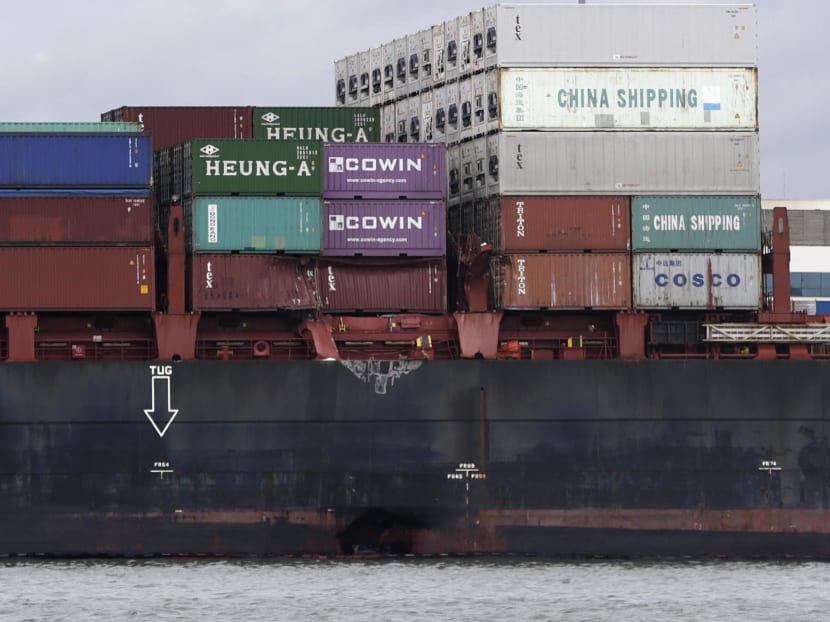Oil spill in Singapore waters after two vessels collide at sea
SINGAPORE — Some 300 tonnes of oil gushed into the waters off Singapore on Tuesday night (Jan 3), after two ships collided off Pasir Gudang Port in Johor, causing fish deaths at one Singapore coastal farm and sparking a flurry of measures to protect nearby mangroves and reservoirs from contamination.

The APL DENVER, anchored at Pasir Gudang Port. Damage to the hull can be seen just at the waterline. Photo: Wee Teck Hian/TODAY
SINGAPORE — Some 300 tonnes of oil gushed into the waters off Singapore on Tuesday night (Jan 3), after two ships collided off Pasir Gudang Port in Johor, causing fish deaths at one Singapore coastal farm and sparking a flurry of measures to protect nearby mangroves and reservoirs from contamination.
The incident, which involved Singapore vessel Wan Hai 301 and Gibraltar-registered container vessel APL Denver, resulted in two oil patches in Singapore waters near the OBS Jetty on the western side of Pulau Ubin and Nenas Channel, said the Maritime and Port Authority of Singapore (MPA) on Wednesday.
The National Parks Board (NParks) had to set up oil-absorbent booms to protect the mangroves and mudflats along the north-eastern coasts of Pulau Ubin, including Chek Jawa Wetland, as the tide was expected to move east yesterday evening.
In addition, booms have also been set up to protect the mangroves at Coney Island Park and Pasir Ris Park, an NParks spokesperson said.
The spill also affected three coastal fish farms in the Eastern Johor Straits, with one farm reporting some fish deaths of about 100 to 200kg, said the Agri-Food and Veterinary Authority of Singapore (AVA).
The AVA had alerted coastal fish farmers in the area of the spill and advised them to stop feeding their fish and to deploy canvas skirting to prevent oil from contaminating fish stocks.
Oil-absorbent pads and canvas sheets were given to 11 farmers closest to the oil spill site to help protect their fish stocks, and the AVA also collected fish samples from coastal fish farms in the Eastern Johor Straits for food safety tests.
The MPA said it was notified of the collision by the Johor Port Authority (JPA) at about 11.50pm on Tuesday. The JPA also deployed four anti-pollution craft after APL Denver had reported damage to one of its bunker tanks, as well as booms to contain the spill.
The MPA spotted the two patches of oil through aerial surveillance. It despatched nine anti-pollution craft with dispersant-spraying capabilities to clean up the spill.
Two skimmers and booms were also placed off the OBS Jetty and Nenas Channel to contain the oil patches, the MPA said.
In an update on Wednesday evening, the authority said no new sightings of oil spills were reported. There have also been no reports of injuries, and traffic in the East Johor Straits and Singapore’s port operations remain unaffected.
Mr Phillip Lim, director of E Marine Bay, who owns three fish farms, said the area surrounding his farm in Pulau Ketam was “full of oil”, and estimates losses of S$10,000 to S$20,000 as he would not be able to sell his lobsters.
He was worried that the spill would spread to Pasir Ris due to the wind direction. “The tide is going up and down, and it spreads the oil,” he said.
“Everyone is buying seafood for Chinese New Year. I won’t be selling fish or lobsters. What to do? Just sit down and cry.”
PUB said it did not detect any oil patches in the seawater near the coastal reservoirs — the Punggol, Serangoon and Lower Seletar Reservoirs.
But as a precautionary measure, it deployed oil-absorbent booms and oil-containment booms near the tidal gates of these reservoirs to block any possible oil residue. “Raw water in the reservoirs is not affected,” a spokesperson added.
Both affected vessels are currently berthed at Pasir Gudang Port. The MPA said it would investigate the cause of the collision.
Johor’s State Health and Environment executive committee chairman Ayub Rahmat said that the collision occurred when the Wan Hai suffered a power failure, causing it to become “uncontrollable” and to hit APL Denver’s starboard tank, reported the New Straits Times.









